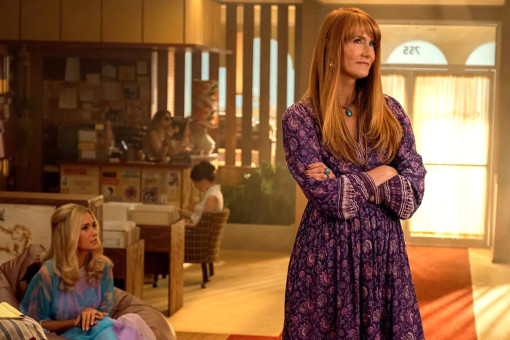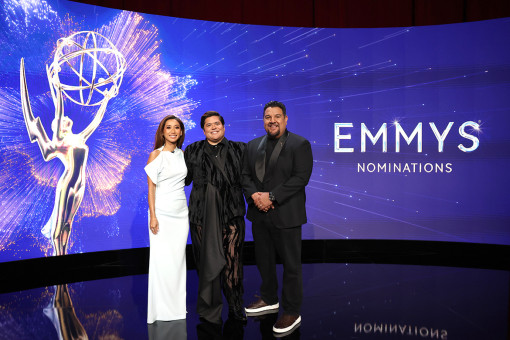The Buccaneers' journey from epic novel to Apple TV+ is quite the tale.
Legendary author Edith Wharton died before she could finish her final novel, The Buccaneers, which centers on five young American women who venture to England in the 1870s to find husbands; it is a more modern and free-spirited story than this plot summary suggests.
In 1993, fifty-five years after Wharton's death, writer Marion Mainwaring completed the novel, using Wharton's detailed outline as a guide, though most readers thought it seemed happier than the darker, bleaker endings for which Wharton was known. A six-episode BBC adaptation starring Carla Gugino and Mira Sorvino followed in 1995.
Now, nearly three decades later, a new, eight-episode take on the story is streaming on Apple TV+. The Television Academy recently spoke to the show's executive producer and creator, Katherine Jakeways, about how she helped adapt Wharton's swansong for television.
Television Academy: What was it about The Buccaneers that so appealed to you that you wanted to translate it to the small screen?
Kahterine Jakeways: Well, I confess, it wasn't my idea. Initially, Beth Willis, who is my partner in crime, the absolute brains behind the whole thing, and my co-EP, had been carrying a copy around for decades. She and I met to talk about potential projects, and I hadn't read it at that stage. I went to read it, and then she and I spent a lot of time talking about how it could work.
What's so wonderful about it as a concept, and why she was so clever in recognizing that it would work so well, is because even on the page, these five American girls are so modern-feeling — we were able to discuss how that could work in terms of [putting the story] through a more modern lens. Even though it takes place in the 1870s, the show does have a very modern sensibility. So often, when you're watching a period drama, you end up feeling like you're looking at a painting. You can admire their costumes, and you can see the headlines of the way they're feeling, but you don't get to really experience that with them. We hope that, in our version, it does come across that these are the kind of girls that a young woman watching in 2023 would be able to identify with.
It felt like those relationships could have been in any show, taking place at any time.
That's exactly what we were going for. In the development of the series, we talked a lot about Lena Dunham's Girls, and how that might feel if those [characters] showed up in the period dramas of our youth and had the culture clash and the sensibilities of that. We are all experiencing similar joy and fear and jealousy and lust and grief. I remember when George Faber, the head of our production company, The Forge, saw the show's rushes from the first day, and he said, "I've never seen that in a period drama before." We were so pleased, because that was what we were aiming for.
What was the decision behind the multicultural casting and the use of contemporary, anachronistic music?
We wanted everything in the show to feed into the emotion of feeling modern. So, of course, the costumes are realistic to the period, although we've sort of done our version of them that hopefully feels fresh and exciting. The locations are all the locations of period shows, and we have been able to have our cake and eat it where we've used all the best bits of various dramas. But the music was such a vital component. We spent a long time in post-production working out exactly how that was going to work, but as soon as we started trying modern tracks over the scenes that we'd shot, it made us feel a fresh kind of thing. You immediately get, "Oh, God, that's how that character feels, because that is a song that I've heard, and that I know has made me feel a certain way." Also, that our show has an all-women soundtrack was very important. It was something that we realized early on was going to help in terms of the tone of the show.
To the casting, we wanted the attitude towards race to feel as modern to audiences as all the other elements did. There's that moment when Conchita (Alisha Boe) actually refers to her skin color when talking to her stuffy in-laws. That was a scene that came quite late in the script, because we talked about it and wanted to include it. In the first episode, she talks to Nan (Kristine Froseth) about the fact that she's pregnant, and she says, "What if they look at my baby the same way they look at me? Because my baby is not going to look like them." But then, when we got to the ball scene in episode three, we realized that the way that the British are treating Conchita is partly her Americanism, and partly her youth and vivacity, but it felt a bit disingenuous to not be addressing the elephant in the room — which is the fact that she has different skin color than them.
Without spoiling anything, let's talk about the ending. It's a departure from the book and actually feels like much more of a Wharton-esque denouement than the one Marion Mainwaring came up with.
It was very important to us that Nan found agency at the end. Although she has made some very bad decisions over the course of the eight episodes, we wanted her to be as true to the person that we want her to be — and that we know she is — and to choose her friends and her sister. The ending needed to be about the girls, and we wanted to be able to punch the air in terms of the fact that they choose each other. And no matter what has gone between Nan and Jinny (Imogen Waterhouse), and how hard their relationship has ended up being, she is her sister. At the end, we hope that it's a triumph of the girls having all banded together and succeeded in saving Jinny. But, also, there's the realization that it has massive repercussions for the rest of Nan's life.
In the final scenes, you set up a potential second season, which was a surprise. How's that looking?
(Laughs) It'd be disingenuous to pretend otherwise, right? We always knew the book was a starting point, and there's a few characters who I'd definitely say we could do more with. But who knows? It depends on whether people love it, and I hope they do.
The Buccaneers is now streaming on Apple TV+.












